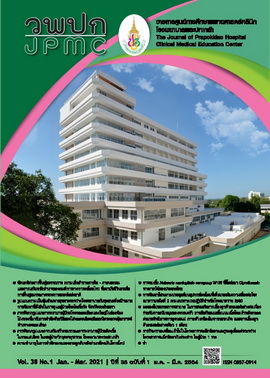Attitude Towards The Rehabilitation, Internal - External Locus of Control and Empowerment of Physical Disabilities at Sirindhorn National Medical Rehabilitation Institute
Main Article Content
Abstract
BACKGROUND: According to the Persons with Disabilities Empowerment Act, B.E. 2550 (2007), there is a plan for the development of quality of life by empowering the disabled to have the potential and strength for society, including knowledge, understanding and creative attitude towards rehabilitation. Recent investigation showed that the attitude and internal - external locus of control affected activities in daily living, independence and maintenance of functions for those with physical disabilities.
OBJECTIVES: This work aimed to study the level of attitudes toward the rehabilitation, internal - external locus of control and empowerment of physical disabilities, to compare the empowerment of physical disabilities by personal factors, to study the correlation between attitude towards the rehabilitation and empowerment of physical disabilities, and to investigate the correlation between internal - external locus of control and empowerment of physical disabilities.
METHODS: The samples used included 186 physical disabilities, which were selected by purposive sampling. Data were collected by questionnaires and analyzed by computer package program. The statistical procedures comprised percentage, mean, standard deviation, t - test, F - test (One - way ANOVA), Multiple Comparison (LSD) and Pearson’s Product Moment Correlation Coefficient.
RESULTS: The results showed that the level of attitude towards rehabilitation in terms of the level of internal locus of control and empowerment were at a high level, while the level of external locus of control was low, physical disabilities with differences in age, marital status, period for rehabilitation, and etiology of disability were different, attitude towards rehabilitation had a positive correlation with empowerment, which was statistically significant at 0.05, and the locus of control in terms of Internal locus of control had a positive correlation with empowerment, while external locus of control had a negative correlation with empowerment (p < 0.001) .
CONCLUSIONS: The results showed that attitude towards the rehabilitation and locus of control affected the empowerment of physical disabilities.
Article Details
References
Ministry of Social Development and Human Security. Empowerment Of Persons With Disabilities Act, B.E.2013. Bangkok: Department of Empowerment of Persons with Disabilities; 2013.
Department of Empowerment of Persons with Disabilities , Ministry of Social Development and Human Security .Situation of disabled people report in 2019 [Internet]. 2020 [cited 2019 Apr 12]. Available from: http://dep.go.th/uploads/Docutents/4700c4a5-791d-47c1-b8be-25e55a3559ddสถานการณ์คนพิการมีค.62.pdf
Biswas CS, Mukhopadhyay I. Marital status and women empowerment in India. Sociology International Journal 2018;2:29-37.
Alves MP, Cunha AI, Lopes T, Abreu P, Vaz C. Measuring empowerment in patients with chronic disease: psychometric qualities of the Portuguese rheumatic disease empowerment scale. Port J Public Health 2018;36:66-71.
Dangdomyouth P, Malai C, Kanhadilok S. Empowerment : roles in nursing. Journal of Nursing Devision 2017;44:159-68.
Miller JF. Coping with chronic illness : over coming powerlessness. 2nd ed. Philadelphia: F.A.Davis Company; 1992.
Gibson CH. A concept analysis of empowerment. J Adv Nurs 1991;16:354-61.
Suna N. Attitudes of people with disabilities toward empowerment. Journal of Ratchasuda College 2013;9(12):4-21
Wang JL, Zhang DJ, Jackson LA. Influence of self-esteem, locus of control, and organizational climate on psychological empowerment in a sample of Chinese teachers. J Appl Soc Psychol 2013;43:1428-35.
Sayon V. The rights of persons with disabilities certification to the constitution of the Kingdom of Thailand 2017: the secretariat of the house of representatives [Internet]. 2017 [cited 2020 Apr 25]. Available from: https://library2.parliament.go.th/ebook/content-issue/2560/hi2560-062.pdf

